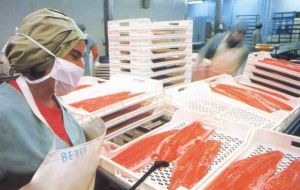MercoPress. South Atlantic News Agency
Scathing report on Chile's booming salmon industry
 Claims of labour abuse and environment shortcomings threaten the industry
Claims of labour abuse and environment shortcomings threaten the industry The environmental NGO Ecoceanos this week released a scathing report on Chile's 2.2 billion US dollars farmed salmon industry, the world's second largest after Norway.
"X-Ray of the Chilean Salmon Industry," which details the industry's shoddy labor and environmental record, was distributed this week to the Chilean and Norwegian embassies in Washington D.C. The 40-page document, based on information collected from government and union sources, notes that 52 salmon industry workers have died in Chile since 2005. Norway, by contrast, has not registered a single industry death since 2000. Twelve of those deaths involved divers, thousands of which work for the industry maintaining net systems or retrieving dead fish from the bottom of pens. In fact, around the island of Chiloé (Region X), three divers have perished in just the past three months. Diving is a particularly dangerous job as the divers can easily get caught up in netting and end drowning. They also risk developing Acute Decompression Illness, also known as "the bends," a potentially fatal condition that occurs when divers ascend too rapidly and/frequently. Some divers have even been attacked by sea lions, which tend to collect around salmon farms. According to Cristián Soto, president of the Puerto Montt-based Professional Divers Union (SIBUP), the salmon industry offers little in the way of protection. Divers, for example, are routinely expected to descend beyond regulation depths: 36 meters for qualified "intermediate" divers. "For those of us who work on installing and maintaining the nets, this is something that happens to us every day. Every day we go down further than we're supposed to. Why do we do it? Because if we don't, we'll be out of work," the SIPUB president told the Patagonia Times in a recent interview. Another problem is the industry's pattern of subcontracting. Many divers and other industry workers don't work directly for the salmon companies in which they labor, but rather for middle-men contractors. Ecoceanos reported that over half of the industry's total labor force works within a subcontracting scheme. Ecoceanos is one of several NGOs participating in the Washington, D.C.-based Pure Salmon Campaign, which looks to pressure salmon farmers into employing more sustainable, environmentally friendly and safer production practices. The Pure Salmon Campaign is not, at this point, calling for a boycott of Chilean salmon products. This is certainly not the first time Chile's booming salmon industry has come under fire. Critics have complained for years that the industry, while no doubt a short-term commercial success, is nevertheless a ticking environmental time bomb. Chile's Region X, where the bulk of the country's salmon is farmed, is saturated, say environmentalists. Huge concentrations of farmed fish mean huge concentrations of waste – both in terms of feces, and uneaten fish food that collects on the ocean floor. The over-concentration of such organic materials has created dead zones in the bays, estuaries and fjords that house Chile's countless fish farms. "They say that the waste being produced today in Region X is equivalent to what's produced by a city of some 5 or 6 million inhabitants. That's the level we're talking about. That is the level of pollution concentration," said Cristian Guttierez of Oceana, an international NGO that has its South America office in Santiago. Another problem is that it takes fish to make fish. Salmon are carnivorous by nature. As such, they are fed pellets derived from other types of fish. According to some studies, it takes between five and 10 kilos of wild fish to produce one kilo of farmed salmon. Chile, in other words, is sacrificing its native fish stocks for the sake of salmon, say industry opponents. "It's a vital contradiction," said economist Francisco Pinto of the environmental policy group Fundación Terram. "The idea behind aquaculture is to produce more food, to make more food available on a global level. It's like an answer to the problem of world food shortages. But salmon producers are doing the opposite (â€Ã‚¦) It's not just sustainable." The Santiago Times




Top Comments
Disclaimer & comment rulesCommenting for this story is now closed.
If you have a Facebook account, become a fan and comment on our Facebook Page!